Search
Showing 10 of 522 results for group registration
-
Upcoming events related to international education – E-News June 2022
Dates
Event
Location
2,3 July
Duc Anh A&T: Global Education Fair
Information for prospective students
Contact: Van Banh
Ho Chi Minh City and Ha Noi, Viet Nam/online
5 July
New Zealand Centre
Announcement of the first batch of joint research proposals from NZ universities and Indian Institute of Technology Delhi
Contact: Jugnu Roy
New Delhi, India
7 July
ENZRA workshop – ENZ is organising a workshop to discuss the vision for the NZ education industry, promotional strategy, and next steps around the border opening. The workshop is exclusively for all India headquartered ENZRA office owners and decision makers.
Contact: Monika Chaudhary
Mumbai, India
July TBC
ENZ/MFAT Alumni Function – ENZ is working alongside Ministry of Foreign Affairs and Trade to deliver an alumni function under the banner of 50 Years Diplomatic Relations, highlighting the importance of our education partnership
Contact: Jane Liu
Beijing, China
9,10 July
IDP Overseas Study Exhibition
Information for prospective students
Contact: Van Banh
Ha Noi, Ho Chi Minh City, Vietnam
9 August
Te Pukenga International Strategy Launch
Media Roundtable: Business-to-business event followed by social networking with agents
Contact: Jugnu Roy
New Delhi, India
11 August
Te Pukenga MoU signing with Maharashtra Government
Formalise the MoU already signed by NZ Trade and Enterprise at a government-to-government level, with the Maharashtra government
Contact: Jugnu Roy
Mumbai, India
10-11 August
EduTECH Expo and Conference
Contact: Alana Pellow
Melbourne, Australia
15-19 August
New Zealand International Education Conference (NZIEC) 2022
The first conference for New Zealand’s international education sector since 2019
Contact: NZIEC@enz.govt.nz
Online
24-25 August
IC3 Annual Conference
ENZ is gold sponsor for the conference, which is the largest high school conference in India. Has participation from 6 of the 8 NZ universities. Supports the India undergraduate market development strategy
Contact: Monika Chaudhary
Hyderabad, India
27 – 28 August
The STAR Education Fair
Information for prospective students
Contact: Naluri Bella
Malaysia
August/Sept
Undergraduates – NZ Global Competence Certificate
Exchange programme focussed on tertiary students from India and NZ
Contact: Monika Chaudhary
Online
13-16 September
European Association for International Education (EAIE)
EAIE is the largest business-to-business conference and tertiary international education event in Europe. This year’s theme is ‘The Future in Full Colour’. ENZ will host a pavilion with New Zealand universities and ITPs and registrations to participate have now closed.
Contact: Olga Elli
Barcelona, Spain
14 – 15 September
Asia Pacific Technical Vocational Education and Training (APAC TVET) Forum
A partnership between ENZ, Te Pūkenga and Skills Consulting Group showcasing NZ vocational sector and its expertise. The forum will include academic and business-to-business/government-to-government elements, bringing together stakeholders across Asia and the Pacific to share expertise and capability.
Contact: Richard Kyle
Online –Asia and Pacific wide
23 September
2022 New Zealand – China Early Childhood Education Symposium
Co-hosted by Education New Zealand and China Centre for People to People Exchange, the third annual Early Childhood Education (ECE) Symposium will be a hybrid event bringing together professors, practitioners and teachers in the ECE field to share best practices. The theme of the 2022 Symposium is “Sustainable Development of Early Childhood Education.”
Contact: Rosemary An
China, Online
Sep/Oct
Market Development Activity (Kalimantan Region)
Information for prospective students
Contact: Naluri Bella
Balikpapan & Samarinda cities Kalimantan Region, Indonesia
21 – 29 October
China Education Expo (CEE)
Annual exhibition tour hosted by China Education Association for International Exchange (CEAIE) since 2000.
This major conference and expo is the leading international education event in China.
Contact: Jane Liu
Beijing, Guangzhou, Chengdu, Shanghai
-
Thirty groups awarded PM's Scholarships for Asia and Latin America
The successful groups were announced by Education Minister Chris Hipkins today, and mark the outcome of the first round of the scholarships since they were paused due to COVID-19.
Education New Zealand Manapou ki te Ao (ENZ) congratulates all the successful recipients, who include a marae, non-profit organisation TupuToa, six of New Zealand's eight universities, Te Pūkenga, and a number of private training establishments.
A full list of recipients is available here.
Chris Hipkins also announced that the scholarships will open for individual applications this month. Applications will be open from 18 July - 31 August 2022. More information, including how to apply, is available here.
About the scholarships
The Prime Minister's Scholarships for Asia and Latin America are funded by the New Zealand Government and administered by Education New Zealand Manapou ki te Ao.
Since 2013, the scholarships have supported more than 2,400 New Zealanders on learning experiences in Asia and Latin America.
-
ENZ’s new partnership with the Manaaki New Zealand Scholarships Programme
The Manaaki scholarships represent the government’s single largest investment in international scholarships and have been awarded for more than 70 years.
The scholarships are a key pillar of Aotearoa New Zealand’s International Development Co-operation, offering more than 1,100 scholarships annually to students from 112 eligible countries to study in Aotearoa New Zealand, in the Pacific, or online.
“This partnership plays to the strengths of both MFAT and ENZ,” says Andrew Needs, MFAT Deputy Secretary – Pacific and Development Group.
“It will help us ensure that not only are we demonstrating manaaki to our scholars, but also offering scholarships that address the skills and knowledge requirements of each of our partner countries.”
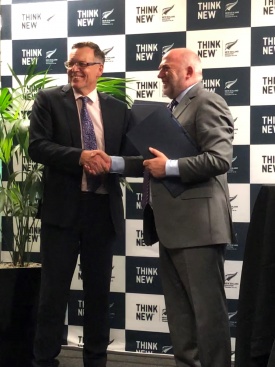
ENZ will participate in joint governance of the programme and provide data and insights to inform investment decisions, as well as operational management, drawing on its expertise in supporting a world-class scholar experience. The partnership offers opportunities to develop closer connections between scholarship partners and tertiary education providers and encourage innovation in product development.
ENZ already manages the Prime Minister’s Scholarships for Asia and Latin America as well as scholarships on behalf of the Ministries of Business, Innovation and Employment, and Primary Industries.
“This is an excellent example of ‘NZ Inc.’ cooperation in action,” said Grant McPherson, ENZ’s Chief Executive.
Two recent Manaaki Scholars are Aminat Razaq from Nigeria, who has completed her New Zealand studies on sustainable energy – you can read about her experiences here; and Jason Nath from Fiji who completed a Postgraduate Clinical Doctoral Degree in Paediatric Dentistry in New Zealand – you can read about his experiences here.
-
Digital skills and global citizenship at #NZAsiaTech Code Camp
A team of six students from Te Kura Māori o Porirua, a predominantly te reo Māori medium school in Porirua, interacted with school students in Japan, South Korea, Thailand, Viet Nam, Philippines, Malaysia, and Indonesia.
The overall theme was tourism, seen through the lens of the United Nations Sustainable Development Goals (SDG) - a theme that is highly relevant for the Asia-Pacific region. Students were given the task of profiling their home country’s SDG initiatives, with a focus on sustainable tourism.
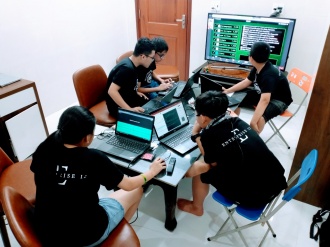
Team Enterprise 12 from Viet Nam work on building website project during #NZAsiaTech Code Camp
The North Asia Centre of Asia-Pacific Excellence partnered with educational coding programme Code Avengers and Education New Zealand Manapou ki te Ao to deliver the event.
“With New Zealand’s borders having been closed for more than two years, it’s crucial that the next generation of students still have opportunities to build cultural competencies and make connections across the globe,” says Education New Zealand’s Regional Director for Asia, Ben Burrowes.
“The #NZAsiaTech Code Camp was an opportunity for Kiwi students to re-establish connections with students in other countries, while gaining critical digital skills to prepare them for the future.
“It also also gave a taste of New Zealand’s education offering to prospective international students from the Asia region, who might consider enrolling in high school or tertiary study in New Zealand in the future.”
Code Camps can help to generate subsequent visits by interested students to New Zealand. For example, the Code Camp held at Waseda Jitsugyo School in 2021 and at Waseda University Junior and Senior High School in 2022 has led to Waseda’s group students’ programme sending around 50 students from three schools to New Zealand for three weeks in March 2023. Code Camp served as a great opportunity for students and teachers from Waseda University affiliated schools to experience our world-class digital education first-hand.
Honam Jeon, the Education Manager at Gangwon International Education Institute said the programme helped increase awareness of New Zealand:
“South Korea is very interested in international engagement and exchange programmes for school students. The #NZAsiaTech Code Camp was a perfect example we want to continue to join. Thanks so much again to ENZ for organising the well-structured programme.”
The online programme included team building exercises, English learning, HTML coding lessons, and the creation of a website by student teams, to demonstrate their understanding of the importance of sustainable tourism.
“As our students look to enter an increasingly globalised word, developing cultural connections and transferable skills is so important,” says Te Kura Māori o Porirua school principal, Whāea Evelyn Wharehinga.
“The Code Camp has been an exciting growth experience for our students, who have extended their digital literacy skills while having the chance to connect with students of different ethnicities and cultures across the Asia-Pacific region.”
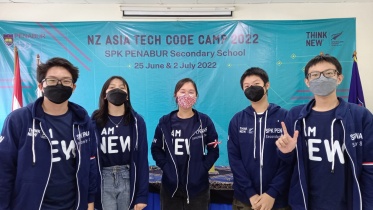
Team Indonesia was the winning team after presenting their newly developed website on Sustainable Tourism to a virtual panel of judges.
The students presented their sustainable tourism-themed websites to a panel of expert judges at the awards ceremony on 2 July 2022, with students from Indonesia winning the top prize.
Steve Budd of Code Avengers, a global edtech company based in New Zealand, said it was a great programme to participate in.
“It was a privilege to gift all participants a one-year free subscription to the Code Avengers site as part of our mission to build lasting digital capabilities for educators and young people, and bridge the digital divide,” says Budd.
-
From the CE: Putting NZ back on the map in 2022-23
With relatively low numbers of international students currently in New Zealand, the primary focus for Education New Zealand Manapou ki te Ao (ENZ) over the 2022-23 year will be on rebuilding the sector. The rebuild will have an emphasis on quality and long-term sustainability. We will be working closely with our key sector partners here and around the world to put New Zealand back on the map.
This focus is reflected in the draft refresh of the New Zealand International Education Strategy 2022-30, in our recently published Statement of Intent 2022-26 and Statement of Performance Expectations 2022-23, and in our internal business planning for the year ahead.
The high impact global marketing campaign, I AM NEW, launched at NAFSA in late May, provides a strong starting point for the rebuild. As well as raising New Zealand’s profile by attracting significant international media coverage, the campaign has so far reached over 115 million users. This is a unified, overarching promotion on behalf of New Zealand’s international education providers – an essential approach for us to be heard in this extremely competitive sector. We have focussed the promotion on ten partner countries: Brazil, China, Colombia, Germany, India, Japan, South Korea, Thailand, United States, and Viet Nam. The current phase of the campaign includes highlighting individual student stories.
Travel to partner countries to support the work of locally based ENZ staff and our NZ Inc agency partners is also an important part of promoting New Zealand’s education. Prime Minister Jacinda Ardern’s visit to Singapore and Japan in April, and Education Minister Chris Hipkins’ travel to the United States, Brazil and Chile in May-June have delivered the clear message that New Zealand is open for business, raised awareness of our quality education offering, and progressed our relationships in these countries. You can read more detailed reports about the trip to North and South America in this month’s E-News, and we’re currently planning our forward schedule of travel to other key partner countries.
After discussions with education providers, we have finalised the programme of in-market events where New Zealand will be represented through until the end of 2022, and this is now available on our website here.
The reopening of New Zealand’s borders has also enabled the Prime Minister’s Scholarships for Asia and Latin America to restart this year, so New Zealanders have the opportunity to learn from international experiences and develop their global citizenship competencies and networks. Decisions were recently announced on the first round of group applications, while applications for individual scholarships are open until 31 August 2022.
This month we also formalised a new partnership between the Ministry of Foreign Affairs and Trade and ENZ that will see ENZ take over operational management of the Manaaki New Zealand Scholarship Programme from November 2022. This is an excellent example of ‘NZ Inc.’ cooperation that plays to each agency’s strengths. You can read more about the partnership in this issue of E-News.
He ora te whakapiri, he mate te whakatāriri – Unity is strength
Grant McPherson
-
Individual applications for PM’s Scholarships for Asia and Latin America now open
“Following on from the successful group applications, the Prime Minister’s Scholarships for Asia and Latin America are now open to individual applications, and this is the only opportunity for individuals to apply in 2022,” Grant McPherson, Chief Executive, Education New Zealand Manapou ki te Ao said.
These scholarships enable talented New Zealanders who are passionate about supporting local and global communities to add an international dimension to their learning and develop their global citizenship competencies and networks.
“We welcome diverse applicants from all stages and walks of life - you don't need to be a current student, and you don’t need top grades. We are looking for applicants who can display qualities like cultural awareness, initiative, and confidence. Previous scholarship recipients have come from a wide range of backgrounds and have studied in a range of fields, including environmental science, languages, law, the arts, and business.”
More than 2,400 Kiwis have benefited from the programme since 2013, contributing to New Zealand’s ability to engage with key partners in Asia and Latin America.
The Prime Minister's Scholarship is open to New Zealand citizens or permanent residents who are at least 18 years old at the time of application and have been a resident in New Zealand for at least 12 of the previous 24 months.
Scholarship funding can be used to cover, for example, tuition fees to undertake a course in Asia or Latin America, flights to and from Asia and Latin America, living and accommodation costs, travel and medical insurance and visa fees.
More information is available on the Education New Zealand Manapou ki te Ao scholarship website here. Applications close on 31 August 2022.
-
Diversification of International Education sees six innovative projects receive funding
Education New Zealand Manapou ki te Ao (ENZ) has today announced the recipients of the International Education Product Innovation Fund.
Just over $1.6 million in funding has been awarded to six organisations, with support ranging from $200,000 to $300,000 for individual projects over the next 12 months.
The projects that received funding span a wide range of activity. They include a global course for rugby coaches developed in partnership with The Crusaders, an online indigenous eCommerce programme, English language learning based on original, high quality drama content, global enterprise coaching and peer group learning, an evolution of an NZ financial literacy platform for global audiences, and virtual reality online medical training focused on childbirth simulation.
Initial response to the Product Innovation Fund saw more than 150 organisations express interest. ENZ designed a rigorous process for submitting and assessing applications, working alongside Creative HQ – a specialist innovation agency. The process involved a clear set of criteria that were communicated to all applicants. A shortlist was prepared, and a final assessment was completed by an independent expert panel comprising external innovation and education experts and senior ENZ staff.
Commenting on the recipients, ENZ Chief Executive Grant McPherson said the innovation and scope of the applications had been eye-opening.
“The quality of the entrants was a clear indication of New Zealand ingenuity, market knowledge and cutting-edge innovation,” said Mr McPherson.
“The sheer variety of fields and technology being utilised shows how advanced the thinking and capability of New Zealand education providers has become. The potential of each of these projects can now be fully explored, and I am confident the lessons learned can be shared for the benefit of our whole education sector, inspiring others to follow their lead.”
The Product Innovation Fund was launched by ENZ in April to encourage providers to design and develop new education products and services for international learners. It is part of the broader refreshed international education strategy and is intended to fund programmes that deliver new, meaningful, and unique learning experiences from New Zealand with education products and services that set New Zealand apart from other countries.
Providers will create new products and services aimed at transforming the way international learning is developed, promoted, and delivered. Funding and support from ENZ will help providers fast-track the exploration and development of new ideas, conduct market research, build prototypes, and advance their global market strategy. Lessons learnt from the programme will assist in developing future education products and services for the benefit of the entire international education sector.
Details of the successful applicants and their projects can be seen here.
Recipient
Funding Amount
Banqer
$300,000
BOMA New Zealand
$300,000
Chasing Time English
$250,000
Te Kaihau Education
$200,000
Te Whare Hukahuka
$255,000
Virtual Medical Coaching
$300,000
ENDS
-
ENZ hosts its first famil since 2019
Eleven public universities were represented in the Malaysian delegation of senior executives from the Multimedia Technology Enhancement Operations Sdn Bhd (METEOR). METEOR is a consortium of universities that aims to provide advanced solutions through technology. This was an exploratory visit, to enable delegates to discuss a range of opportunities and possible partnerships with New Zealand universities and Te Pūkenga.
The visit was exciting on many fronts as our institutions demonstrated their expertise and explored mutually beneficial relationships, regions showcased their attractions, and the famil delegates from Malaysia experienced many aspects of New Zealand.
The eight-day visit included Wellington, Canterbury and the Waikato. While the start of the week coincided with a cold southerly storm, this was mitigated by warm hospitality and the promise of sun later in the week.
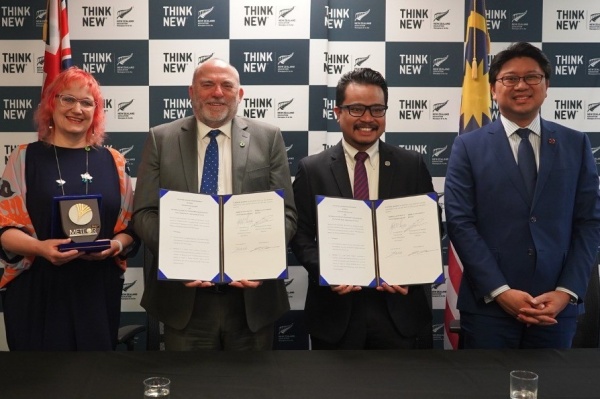
L to r: Lisa Futschek, GM International at ENZ; ENZ’s Chief Executive Grant McPherson; Mr Muhammad Afiq Bin Redzuan, Group Chief Executive Officer at METEOR; and YB Senator Tuan Jaziri Alkaf Abdillah Suffian, after signing an Education Cooperation Agreement.
The delegation was fortunate to meet with Minister of Education Chris Hipkins during their visit. While in Wellington they also signed an Education Cooperation Agreement with ENZ that provides a framework for our relationship going forward. They also met up with Malaysian students at various institutions and heard about their personal experiences here.
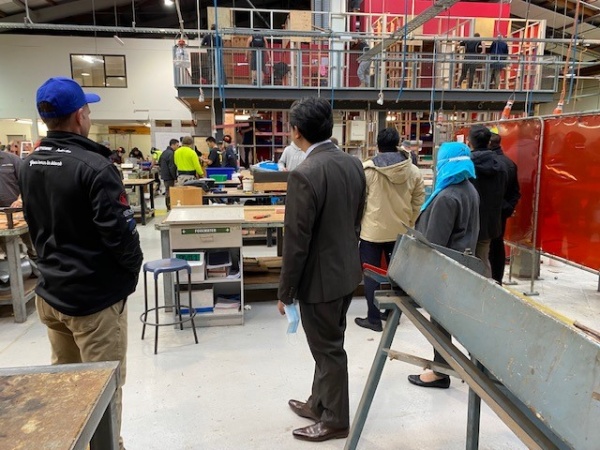
The delegation saw trades in action at WELTEC’s trades campus where they observed building apprentices on a block course.
Famils are important for ENZ as well as for New Zealand institutions, as they establish relationships and strengthen people-to-people links. They are also a key way to showcase some of the best education New Zealand has to offer across different regions.
ENZ looks forward to hosting more famils in the coming months, in partnership with institutions and regions throughout New Zealand.
You can read more about the METEOR famil on the Ara website here.
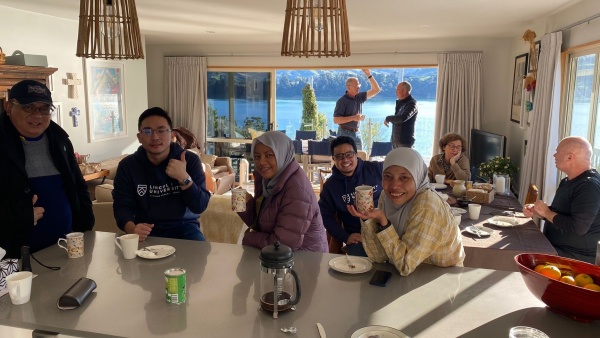
A Kiwi welcome was on offer at a private bach in Duvauchelle near Akaroa.
-
Reconnecting in Malaysia
Six of our eight universities participated, along with Education New Zealand Manapou ki te Ao, connecting with more than 5,200 Malaysian students and parents. This was the first in-person fair we have attended in Malaysia for two years. It was a good opportunity to meet students face-to-face, to discuss a high-quality New Zealand education and what it’s like to live here.
New Zealand’s High Commissioner to Malaysia, Pam Dunn, spoke at the opening ceremony and highlighted that many Malaysians who studied in New Zealand have returned home to use their skills and knowledge as experts in their fields – students such as Tan Sri Dr Mazlan Othman.
"She was the first Malaysian woman to gain a PhD at Otago University. She then returned home as Malaysia’s first astrophysicist and later pioneered this country’s space programme.
“An education in New Zealand empowers Malaysian students with the life skills and confidence to succeed.”
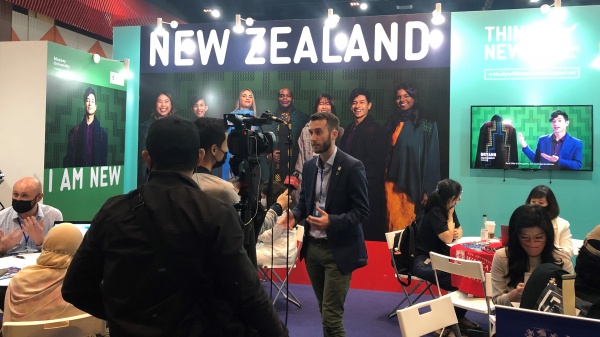
Patrick Holden, ENZ’s Director International Market Strategies, was interviewed by the STAR Media Group – see the video here.
-
Important update: passport requirements for temporary visa applicants offshore
Immigration New Zealand has announced a change to passport requirements that affect a number of temporary visa applicants offshore. This change is in effect now.
The change means that people applying from offshore for a student, visitor or work temporary visa only need to send Immigration New Zealand a high-quality scan of their passport, not a physical copy.
An Immigration Officer may still ask for a physical passport if they consider it necessary for the application. This will be on a case-by-case basis.
This is a temporary measure to help with visa processing. People applying for a student visa or group visitor visa through the Immigration Online form will currently receive an automated letter asking for a physical passport to be submitted. This is not required, and Immigration New Zealand is working to update the letter to reflect the change in requirements.
Visit Immigration New Zealand to learn more about passport requirements.

